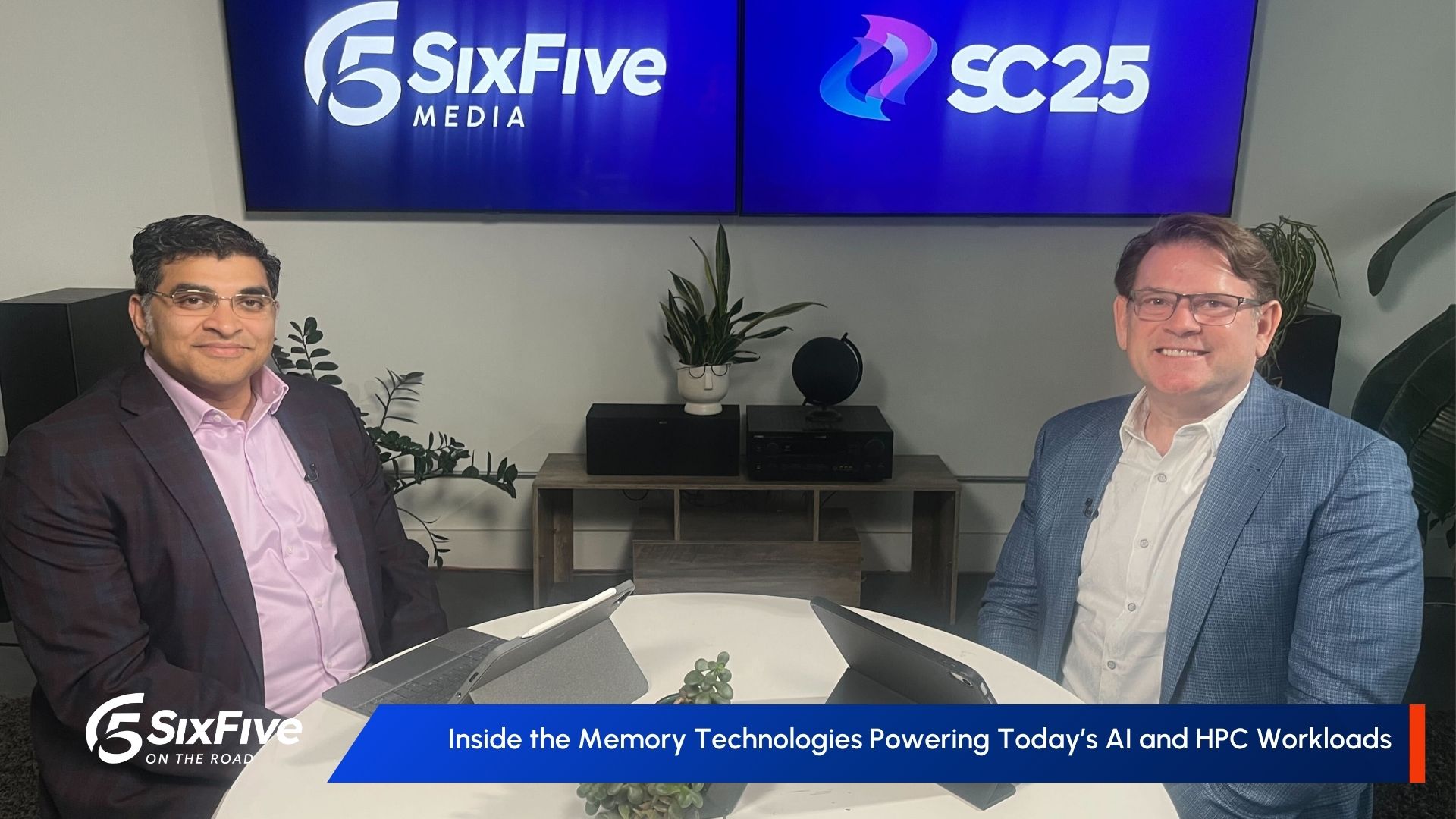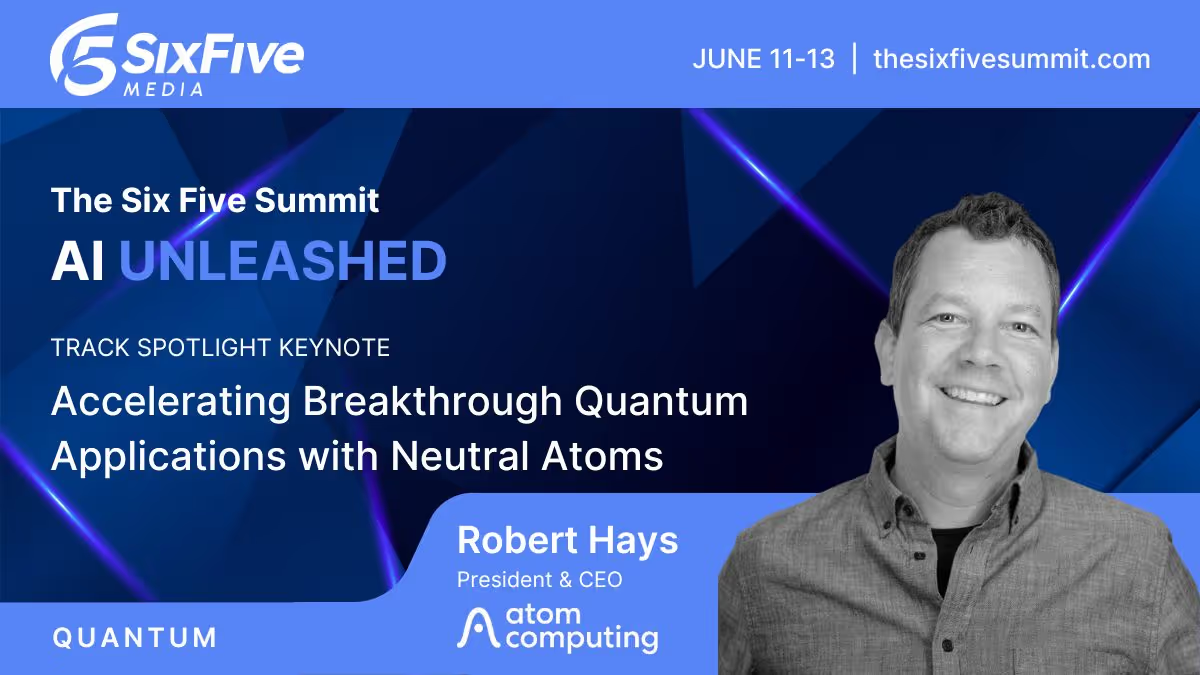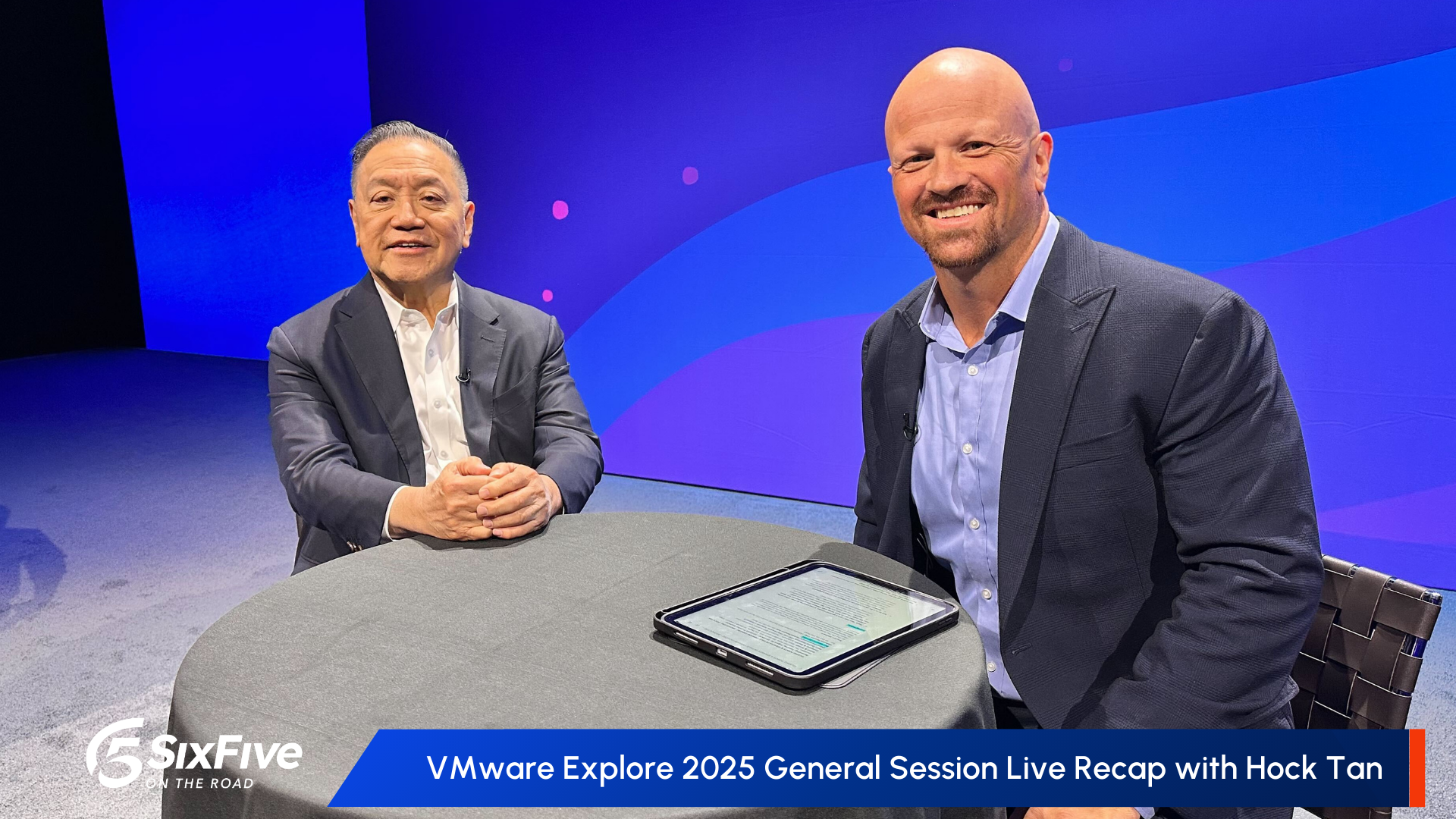From AI Chips to AI Systems: Delta’s Breakthrough Cooling Innovations - Six Five On The Road
Dr. Nick Tan, GM at Delta Electronics & Jeff H. Chang, Sales Manager, joins David Nicholson to discuss Delta’s innovations from chip-level cooling to large-scale systems and how these technologies are powering the sustainable evolution of AI data centers.
There’s no question that the rapid adoption of AI is driving data center cooling innovation—what role do next-gen solutions play in enabling sustainable performance?
From SC25, host David Nicholson, Global Technology Advisor at The Futurum Group, is joined by Delta Electronics America's Dr. Nick Tan,General Manager of Liquid Cooling System Business Unit & Jeff H. Chang, Sales Manager, for a conversation on Delta Electronics and their “Chip-to-System” approach to AI data center cooling. They explore how Delta’s comprehensive thermal innovations are addressing critical trends, challenges, and anticipating the future of energy-efficient AI infrastructure requirements.
Key Takeaways Include:
🔹Industry leadership in “Chip-to-System” cooling: Delta’s portfolio spans microchannel lids to large-scale In-Row CDUs, targeting emerging density and performance demands in AI data centers.
🔹Chip-level innovation for sustainability: Micro Channel Lid and Integrated Heat Spreader technologies improve energy efficiency and reduce environmental impact at the component level.
🔹Scalable, hybrid solutions for hyperscalers: Delta’s hybrid liquid-and-air systems and collaborations with hyperscale cloud providers enable adaptable, open, and efficient cooling frameworks for expanding AI workloads.
Learn more about Delta’s “Chip-to-System” cooling innovations at www.deltaww.com
Watch the full video at sixfivemedia.com, and be sure to subscribe to our YouTube channel, so you never miss an episode.
IMPORTANT: Note to Uploader: VIDEO EMBED - added by uploader.
Or listen to the audio here:
Disclaimer: Six Five On The Road is for information and entertainment purposes only. Over the course of this webcast, we may talk about companies that are publicly traded, and we may even reference that fact and their equity share price, but please do not take anything that we say as a recommendation about what you should do with your investment dollars. We are not investment advisors, and we ask that you do not treat us as such.
David Nicholson:
Welcome to SC25 here in St. Louis, Missouri. This is the supercomputing conference to end all supercomputing conferences, Talking All Things HPC. And we're gonna get into a very cool subject with Delta Electronics, specifically talking about their cooling solutions that go from the chip level all the way through the system and data center level. And I have two very interesting guests to talk about that. Dr. Tan, welcome. And Jeff Chang, welcome. I just want to jump right in. Delta Electronics has what it refers to as a chip to system approach, sort of a starting at the microprocessor level, going through amazing systems like the CDU, behind us, what were the customer challenges and market trends that you've seen that led you to go in that direction?
Dr. Nick Tan:
So the chip-to-system comes with higher computing density and higher thermal loss driven by AI and HPC workload. Traditional cooling is reaching the limit such as the chip power over 1,000 watts and the rack density over 100 kilowatts. Customers now require scalable, energy efficient, and easy deployable cooling systems that work across from grid to system. So, Delta offers an integrated cooling system from chip ball, rake, and system level. This end-to-end design maximizes performance and energy efficiency while enabling modular scalability and simpler deployment. By unifying cooling at all layers, Delta supports the sustainable, long-term growth of a global AI infrastructure.
David Nicholson:
I'm interested in your micro-channel lid and integrated heat spreader technologies, and I'm curious about how your history with your sort of core competence in sustainable energy solutions has fostered that. What can you tell me about that?
Dr. Nick Tan:
So, Delta micro-channel lid and integrated heat spreader technology are engineered to deliver superior thermal performance at the chip interface. And this solution leverages Delta Precision Thermal Engineering expertise to reduce the thermal resistance and improve heat transfer efficiency.
Jeff H. Chang:
Yeah, and this technology is led by the next group of engineers while allowing people to go into higher computing energy needs, also reducing the energy footprint moving forward for next generation upcoming AI service. And when we call it a micro channel lid, the form factor is like a lid on the. Yes, I think traditionally we do the cold plate on top of the lid. Delta is starting on using the lid to target the heat source from where it comes from. So to better spread the heat source before the cold plate gets to target, do the cooling job on the chip. And that's something that would be designed in.And would sort of enter the supply chain at an earlier point. Exactly. Yeah. At the chip design level.
David Nicholson:
Very interesting. Well, so when we look at AI data centers, right now we're absolutely pushing the limits of density and power to an AI rack. What are the advantages of your liquid to air hybrid systems in terms of balanced performance?
Dr. Nick Tan:
AI data centers now operate at a high power density that requires an integrated approach rather than a single cooling method. So Delta's portfolio spans ball-level, subsystem, and system-level cooling, enabling flexibility deployment in both new-built and retro environments. and the liquid cooling solution including core plate for next generation AI chip, in-roll CDU and rack manifold for high capacity heat removal. Air cooling solutions range from high-efficiency server fans to advanced HVDC fans designed for room and facility-level cooling. So Delta Total Thermal Solutions provides seamless integration for next-generation infrastructure.
David Nicholson:
So this is not a one-size-fits-all world at this point?
Jeff H. Chang:
No. And air cooling is still relevant today. Yes. However, it is a one-stop shop at Delta Cooling Solutions. As we started from cooling our own power supply, now we're moving to what Nick has mentioned, the liquid cooling side, right? So we're going to be focused on efficiency, efficiency. Let's talk about, you say, one watt at cooling level. So that translates into exponentially energy saving at a facility level. Like, for example, let's say if you're a farmer, you're farming apples. With years of experience and expertise, you can actually produce one extra apple per tree. And let's say you have 1,000 trees, they give you 1,000 extra apples, right? One watt, 1,000 watts. Now you have megawatts, one million apples, something like that.
David Nicholson:
Yeah, I love the orchard analogy. Let's stick with that for a moment, because imagine we're looking at this and this is one apple tree. When you look at a hyperscaler like Google, who has arguably very, very, very large orchards of servers and things that need to be cooled. What are you doing to collaborate with hyperscalers like Google?
Dr. Nick Tan:
So Delta contributes to industrial-wide innovation in open and scalable cooling systems for hyperscale AI environments. solutions such as 2MW in-raw project issues, open-CDU, highlight the market shift toward large-capacity modules and serviceability, liquid cooling design, slow, close engagement with hyperscale, such as the Google Delta Alliance engineering roadmap with customer operation needs and real-world data center challenges. By supporting open architecture and energy efficient design principles, Delta helps accelerate the industrial transition towards a scalable cooling ecosystem built for AI growth.
David Nicholson:
So something like this model that we see behind us would be designed into, say, you know, hyperscalers often refer to a pod of infrastructure. This would be two megawatts worth of cooling. And as those monster data centers are built out, you would think of two megawatts, two megawatts, two megawatts, and it would be part of the design.
Jeff H. Chang:
Yes, as Google's TPU design, I think the perspective is to start with, they want to put all the TPU together, denser and denser, right? Yeah, as they progress in their routes, you need more cooling, right? So we're starting changing from NREG into the in-row scale and then multiple in-row scale moving forward working with Google.
David Nicholson:
As you look ahead and you think about your integrated thermal solutions, how is this going to shape sort of the evolution of next generation AI and high-performance computing in general? If we think about power coming in, heat needs to be dissipated. First of all, we have to figure out how to generate the power, but so how will you be shaping that evolution moving forward?
Dr. Nick Tan:
Delta's integrated thermal solutions are positioned to drive the global evolution of AI and HPC by bridging sustainable, scalable, and high-performance solutions. We bridge chip-level, array-level, facility-level cooling to optimize thermal performance. across the entire computing ecosystem and the long-term vision is to enable a carbon smart data center where Intelligent power and thermal systems work together to minimize energy waste and support overall grid standards. This innovation supports the industrial's broader movement toward net-zero goals while unlocking higher computer density and performance for future generations of AI and HPC systems.
David Nicholson:
It makes a lot of sense. And when you look at the significant constraint that the availability of power represents. One way to attack that is, oh, just generate more power. We're not sure exactly how the world is going to do that yet. But along the way, making sure we use that power as efficiently as possible by doing exactly what you're doing, starting out at that microgrid lid level, all the way through every step, liquid, liquid air hybrid, all the way through what is now a two megawatt standard. You're attacking that from an efficiency perspective, one step at a time. I'm curious, do you see in the future more standardization across or do you think that your chip through system design is going to be something that will be needed forever?
Jeff H. Chang:
Like you said, right? It's a bit of speculation. Yeah, but like you said, right? I think people are driving into a standard, like OCP, like Nvidia is driving everybody to be a standard, right? To make it more efficient for everybody, right? As we know, we are moving into AI, as an AI, as a backbone of the human being, right? So the efficiency of power, you can mention that, and also the cooling solution, the driving force, right? The pace of progress of our AI moving forward, right? So at Delta, we position ourselves not only as a technology solution provider, but actually a thought leader on the sustainable foundation in this AI era moving forward.
David Nicholson:
Any final thoughts from either of you?
Jeff H. Chang:
Maybe one more last thing. As Ning mentioned, the chip level reaches 1,000 watts. The viewers, by the time you see this, it's probably 2,000 watts. While we're all impressed by 1,000 watts, we're pushing towards 2000 watts. I like to remind people that the average hairdryer might be around 1500 watts. Imagine 30 or 40 or 50 or 60 of those things generating heat in a cabinet. We're talking about massive amounts of heat that has to be dissipated. It's nice and cool. Yes, it's nice and cool here, and we're very comfortable. It's hard, until you're standing next to these systems that have to be cooled, it's hard to fully appreciate it.
David Nicholson:
But that's an excellent point. So watch that. By the time you see this, yeah, the era of 2,000-watt GPUs will be upon us. Dr. Tan, Jeff, thanks so much for spending time with us to talk about your cool technology. For Six Five In The Booth, I'm Dave Nicholson. Stay tuned for more exciting coverage of all events related to supercomputing and the HPC industry.
MORE VIDEOS

Inside the Memory Tech Powering Today’s AI and HPC Workloads – Six Five On The Road
Girish Cherussery, VP/GM AI Solutions at Micron, joins David Nicholson to explore the latest memory technologies powering AI and HPC, breaking down current bottlenecks, emerging architectures, and what data center leaders need to know now.

The View from Davos with Snowflake: From AI Ambition to Enterprise Impact
AI ambition is everywhere. Enterprise impact is not. From Davos, this session with Sridhar Ramaswamy, Patrick Moorhead, and Daniel Newman examines why data foundations, governance, and execution discipline now determine which organizations can turn AI into real business outcomes.
Other Categories
CYBERSECURITY

Threat Intelligence: Insights on Cybersecurity from Secureworks
Alex Rose from Secureworks joins Shira Rubinoff on the Cybersphere to share his insights on the critical role of threat intelligence in modern cybersecurity efforts, underscoring the importance of proactive, intelligence-driven defense mechanisms.
QUANTUM

Quantum in Action: Insights and Applications with Matt Kinsella
Quantum is no longer a technology of the future; the quantum opportunity is here now. During this keynote conversation, Infleqtion CEO, Matt Kinsella will explore the latest quantum developments and how organizations can best leverage quantum to their advantage.

Accelerating Breakthrough Quantum Applications with Neutral Atoms
Our planet needs major breakthroughs for a more sustainable future and quantum computing promises to provide a path to new solutions in a variety of industry segments. This talk will explore what it takes for quantum computers to be able to solve these significant computational challenges, and will show that the timeline to addressing valuable applications may be sooner than previously thought.





